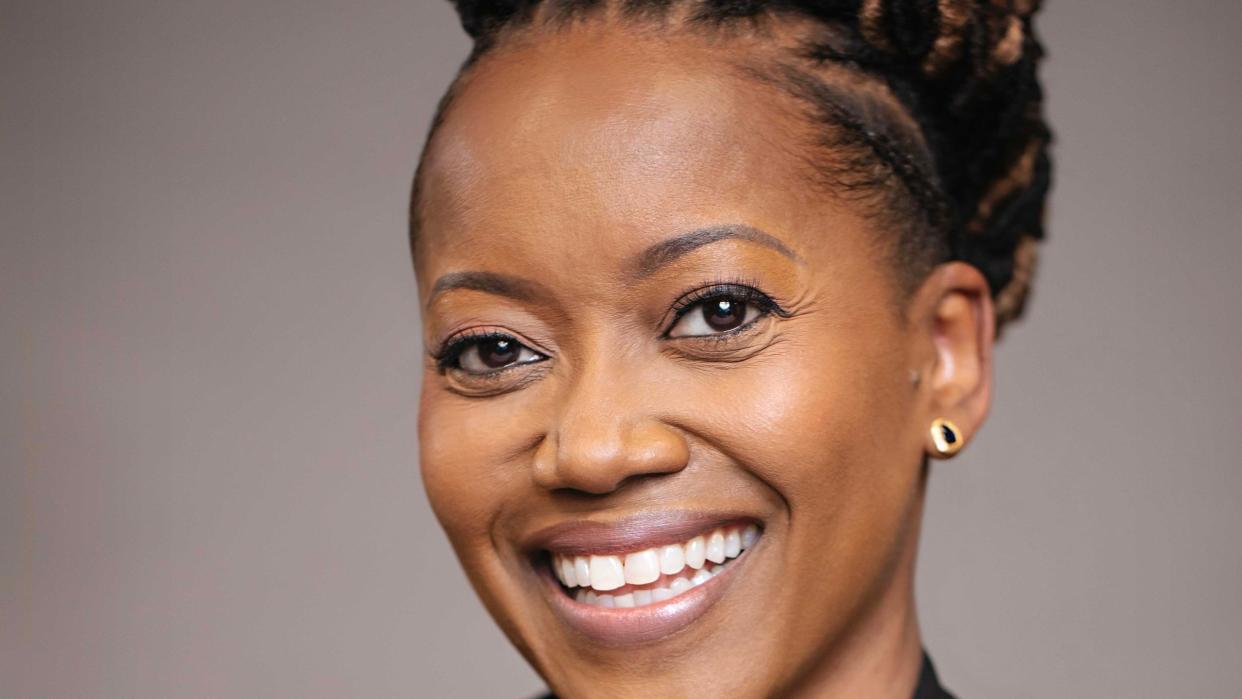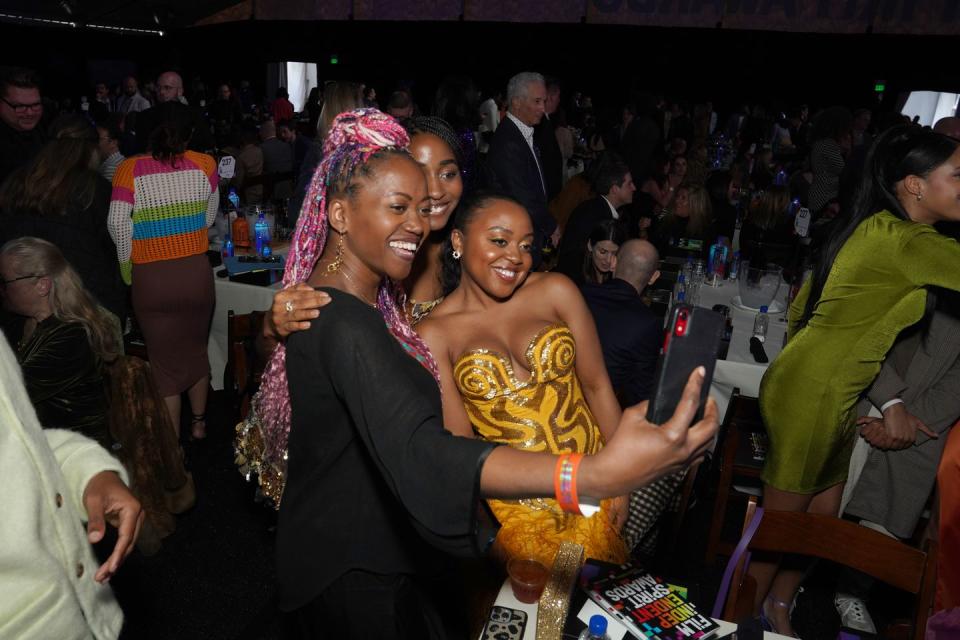Erika Alexander Is Always the Maverick

- Oops!Something went wrong.Please try again later.
- Oops!Something went wrong.Please try again later.
"Hearst Magazines and Yahoo may earn commission or revenue on some items through these links."
In A24’s Earth Mama, filmmaker Savannah Leaf’s feature directorial debut, a poor Black mother fights to reunite with her two children in foster care while also wrestling with what to do about her current pregnancy. Main character Gia (Tia Nomore) is helped by her community, including a social worker named Miss Carmen, played by Erika Alexander.
Alexander is best known for her role as Maxine Shaw, Attorney at Law, in the ’90s sitcom Living Single. Since her time playing one-fourth of our favorite friend group, the actor has made her way down an offbeat path with a career that has included creating her own comic books, political work, and co-founding production company Color Farm Media. More recently, Alexander has returned to screens big and small in projects like Queen Sugar, Get Out, Black Lightning, and Run the World. Yes, we’re in the midst of an Erika Alexander renaissance.
Harper’s Bazaar sat down with the actor to talk about Earth Mama, playing a social worker, her Living Single legacy, and more.
Interview has been edited for length and clarity. This interview took place before the SAG-AFTRA strikes.
Talk about your role in Earth Mama and how you got attached to the project.
Miss Carmen is the person who is trying to shepherd these young women through hard decisions. The film is about young mothers, mostly young Black mothers, who are caught in a system. The system is supposedly there to help them, but it often can hinder them, because they have to meet all sorts of requirements and if they are having trouble with addiction or poverty, it doesn’t really allow much for that.
Tia Nomore is playing Gia. She is stuck between a rock and a hard place, where she has two children already in foster care, and along the way she has to decide whether [the baby she’s pregnant with] she wants to adopt out. It’s a hard decision, and Miss Carmen is there as her conduit.
Savannah Leaf is the neophyte director. She had done a documentary called The Heart Still Hums, and [Earth Mama] is the feature version inspired by the documentary, and she’s done a fantastic job. It’s Tia Nomore’s first time as an actress. She is a rapper and a musician in the Oakland area, along with Doechii. Doechii is also making her acting debut, and everyone knows how fierce she is, as an artist and a performer. Just an amazing cast that [Leaf] put together, mostly from first-time actors in the Oakland area. So I’m kind of like veteran in the space.
You also play a social worker in the 2022 film Wildflower. How did it feel playing those two roles back-to-back?
I thought it was really freaky that suddenly I was getting to play two social workers in a row. But I’m surprised I haven’t played [that role] more often, because my mother was a social worker. My sister is a social worker who worked in adoptions in Philadelphia. [My family is] all in public service in some way, doing things like that.
So I knew the space very well. It’s a very hard space; [it’s easy] to get burnt out. A lot of those people do not make it year after year. There’s high rates of depression and frustration, there’s a lot of things that slip through the cracks.
You do a lot of social justice work. How did it feel to extend your activism to what you do onscreen?
I love it. I’m here on this earth for a very short time. And I figured not everything is going to line up with something that you really believe in or have an opinion about—nor should it. I’m an actress, and I’m often a tool in the toolbox playing a role. But in this case, I do believe that we don’t tell enough of these stories. Young Black women are often left in the dark, but this gives them a chance to glow in the dark. I think it’s a beautiful thing when you can shed light and tell a story about something that seems fresh and new, because no one’s paying attention. But it also shouldn’t have to seem fresh and new. We should know more about this space and about these people. We have a lot of programs in America that talk about Black men. But not enough talk about Black mothers. And so this is a real wonderful thing.
And obviously with Wildflower, you’re dealing with neurodivergent parents. [The main character] was a young woman who grew up with two neurodivergent parents and is now trying to go to college and trying to figure out whether she can leave them, but still, she’s there to make decisions. Young women being asked to tell a story that’s outside of materialism or their bodies or their careers is very rare and [those stories are] hard to get funded. So I’m happy to be a part of both of them.
Which reactions to Earth Mama have stuck with you?
[Audiences] love it. They’re overwhelmed and very touched by it. Very moved. We premiered at Sundance, and we were the first film they played. And the new director of Sundance started to cry when he talked about it and was really overwhelmed with feeling, for not only the piece itself—which he thought was masterfully done and a great debut by a new filmmaker—but he also was overwhelmed because I think he just really felt honored. To be having that discussion and also saying that this is the type of work that Sundance stands for and has stood for in the past. And that he would be able to shepherd [a film] that started a conversation around Black women and motherhood.
I think that this is going to be great word of mouth. I’m really happy to see that so far, the reception has been really sincere and positive.
Your career has blossomed in the last few years in particular, with a slew of projects including Get Out, Queen Sugar, Black Lightning, and Run the World. Tell me about the Erika Alexander renaissance we’re living through.
Is it a renaissance?! The Erika Renaissance. Oh, I love it. I’m gonna tell everybody. It’s been 40 years next year that I’ve been in showbiz. I was discovered when I was 14 in a basement theater called New Freedom Theatre, and I was lucky enough to go to an open call, and they chose me. When the dust cleared for this independent film, just very much like Tia Nomore, I was discovered. Geraldine Page and James Earl Jones and Mary Stuart Masterson were the veterans, and then they were looking for all these young girls to play a part. I ended up going around the world with the Royal Shakespeare Theatre. I ended up doing a miniseries called Common Ground with CCH Pounder and The Forging of a Nation, about George Washington, these big miniseries.
But I also was playing roles of a foster child, a prostitute, and a slave. I didn’t think that I could sustain it because I didn’t think that those were roles that I wanted to do. There were no ingenues when I was growing up in this space. There wasn’t even Nia Long yet, or Halle Berry, no Viola Davis. None of them—but there was Cicely Tyson, there was Regina Taylor, there was Gloria Foster, there was LaTanya Richardson, and these types, and these are the people who raised me. So I’d like to think that they raised me to be resilient and for the long haul, because no one thought that they were getting some sort of career overnight that would match up to the stars of that day, which were Helena Bonham Carter—all these damsels in distress, beautiful, sort of idealistic versions of women. And the fact that I could live past all that and end up playing Maxine Shaw, Attorney at Law, do the Living Single thing, that’s 30 years this year. That’s huge.

Speaking of your iconic role in Living Single, I would be doing readers a big disservice not to ask about Maxine. As you said, August is the 30th anniversary of the series’ debut, and the impact of that show continues to reverberate. I can say without a doubt that so many professional Black women like myself are inspired by the entire cast, but especially by your character. So can you tell me about the impact of Living Single? And at the time, did it feel like you were making an impact?
First of all, thank you so much. It’s a beautiful thing, what you’re saying. No, we had no idea. I think I was 23 at the time. And it was another job for me. It was actually not even the job I wanted. I was trying to get on M.A.N.T.I.S. M.A.N.T.I.S. was being done by Sam Raimi or something, and I was going to be the Black Lois Lane and be with Carl Lumbly. And then I ended up not getting it and was in second position to go on an audition for Living Single. And ended up getting it and was at odds with even doing it, ’cause I didn't really have a feel for it. And then it turned out to be something that I learned so much from as a sitcom actress … I didn’t think I was funny. I didn’t understand the relationship between the film, television, camera, and the studio audience. But by the time I got to Living Single, I figured it out.
And because I was the fourth lead, I was able to sort of go along and not be bothered too much with expectation. They were looking at Queen Latifah and Kim Fields and Kim Coles to make the show. So, I think that it gave me a chance to sort of play around and find something unique about the character. And I brought a lot of myself in Maxine Shaw. I was influenced by Redd Foxx, Michael J. Fox. I loved Jack Lemmon, who, in The Great Race, the movie, he played Professor Fate and you can see a lot of Professor Fate in Maxine Shaw. Also my sister Carolyn, who I just thought was just the weirdest person I knew—that’s who Maxine Shaw is.
Obviously she’s written by a real person named Yvette Lee Bowser, who says she is Maxine Shaw—and to that point, wanted to be a lawyer, and named the character after her own lawyer, Nina Shaw. But if you took all of us together—Kim Fields, Kim Coles, and Latifah and me—we were four independent performers who had very strong opinions and were individuals. And it’s not the easiest thing to work, but we had so much respect for each other that that’s partly what you see in the chemistry. And it’s also hard with an ensemble to know who to throw the ball to. Often if you’re with comedians, they want to keep it and, you know, play too much with any one joke and it’s not a shareable space.
But to the point of Maxine Shaw, there’s a whole Maxine Shaw effect and I have been stunned by how many people and the caliber of people who said “I went into law” and “I went into communications” or “I went into a leadership position” because of Maxine Shaw. That’s people like Stacey Abrams and Ayanna Pressley and Marilyn Mosby, [former New York City mayor Bill] DeBlasio and his wife, Chirlane McCray. They’ve all sat me down and told me this. Do you know how amazing that is? So representation matters. And Maxine Shaw lives. The Maverick rides, and thank God for syndication.
You Might Also Like

